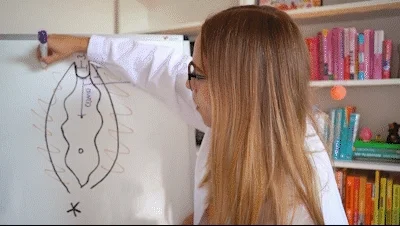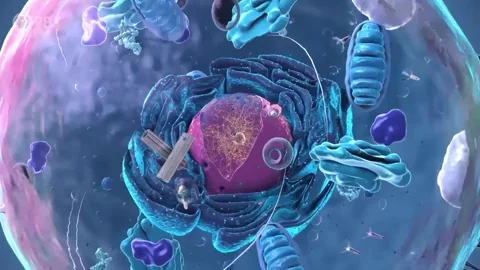It’s 10 PM. Your biology exam is tomorrow. The textbook is open...but your brain? Offline. 😩
Sound familiar? You’re not alone.
Here's the good news...there are smarter ways to study that work with your brain, not against it.

Imagine this instead...

You remember what a chloroplast does because you: 🧠
watched a video about it
made up an acronym to help you remember
drew it out
taught it to a friend
That’s the power of active studying. Ready to try a smarter way to study? Active study techniques will help you better understand and apply what you're learning in biology.
Why Do Active Study Techniques Work?
Your brain can grow like a muscle, but only if you train it right. Believe it or not, you can rewire your brain by studying the right way.
A study from Harvard found that students who use study techniques like visuals, active recall, and hands-on practice retain more and stress less.
So if biology class is starting to feel like a wild jungle of terms, processes, and confusing diagrams, don’t panic. Just change how you study.
And yes, with active study techniques, you can finally remember exactly how the mitochondria works — beyond remembering that "the mitochondria is the powerhouse of the cell." 😉

Active Study Techniques: Study Smarter, Not Harder!
1. Make your own notes 📝
 Don’t just read the textbook, write it out in your own words. Taking notes helps your brain process and store information longer.
Don’t just read the textbook, write it out in your own words. Taking notes helps your brain process and store information longer.
Use mnemonic devices to help remember complex details, and try color-coding key terms and concepts to keep your brain engaged.
2. Draw diagrams and concept maps 🧠 🖍️

Biology is full of processes and systems. Drawing them can help you visualize connections.
Sketch cell cycles, organs, or food chains. You don’t have to be an artist for these study techniques to work! Even a rough sketch can help you remember the flow and structure.
3. Understand it, don’t just memorize 🧬

Memorizing facts like “mitochondria = powerhouse of the cell” might get you through a quiz, but understanding why mitochondria produce ATP helps you apply that knowledge in the real world (and on tougher questions).
Try using the SQ3R Method — Survey, Question, Read, Recite, and Review. This study technique helps you actively engage with the material and deepen your understanding, rather than passively reading it.
When you understand the why, your brain builds stronger connections, and that means better long-term learning.
Example: Instead of just reading about photosynthesis, ask why plants need sunlight, summarize the process in your own words, and quiz yourself. 💡
4. Watch videos for clarity ▶️

Biological processes are dynamic. YouTube channels like CrashCourse or Amoeba Sisters bring tough concepts to life.
Seeing proteins bind or blood flow simulated visually helps reinforce learning better than text alone.
5. Talk it out with peers 👥

Explaining a concept to someone else is one of the most effective study techniques because it forces you to actively recall the material, clarify your thoughts, and identify gaps in your knowledge. This is called the protégé effect.
Create a study group where you can teach each other and fill in gaps in understanding.
Quiz: Choose Your Study Technique 🧪

You have a biology exam in three days. You’ve been attending lectures but haven’t reviewed the content in-depth yet. You’re feeling a bit anxious — you want to retain the information well, not just for the test, but long term.
Which study techniques would work best for this situation?
A. Teach the content to a peer.
B. Re-watch short videos on key concepts.
C. Draw diagrams of biological systems.
D. Re-read your notes.
Quiz
Choose all that apply:
Levelling Up Your Study Game
Mastering biology (or any subject!) isn’t just about cramming the night before — it’s about using smarter study techniques that stick.
One of the most effective is spaced repetition. This means reviewing information at increasing time intervals, like at Day 1, Day 3, and Day 7 to strengthen memory. It's backed by research and is great for long-term learning, especially in science-heavy courses.
Want to level up your biology study skills? Start by using tools and strategies that work with your brain, not against it.
Try tools like:
Pro tip: Check if your campus has a learning center. They often offer study coaching, tutoring, and strategy workshops that can help you personalize your study routine. 💡
 Photo by Japheth Mast on Unsplash
Photo by Japheth Mast on UnsplashTake Action
Biology is the science of life, and the best way to learn it is by getting involved in it. Draw, watch, talk, write, question, and most importantly, understand.
The more curiosity you bring, the more it clicks!

Here's a summary of the top study techniqies:
 Further reading:
Further reading:
Check out the Byte 3 ways to study smart for more on active learning.
Read this article: 13 effective study methods and how to use them (2025)
Read Lessons in Learning by The Harvard Gazette.
Your feedback matters to us.
This Byte helped me better understand the topic.
